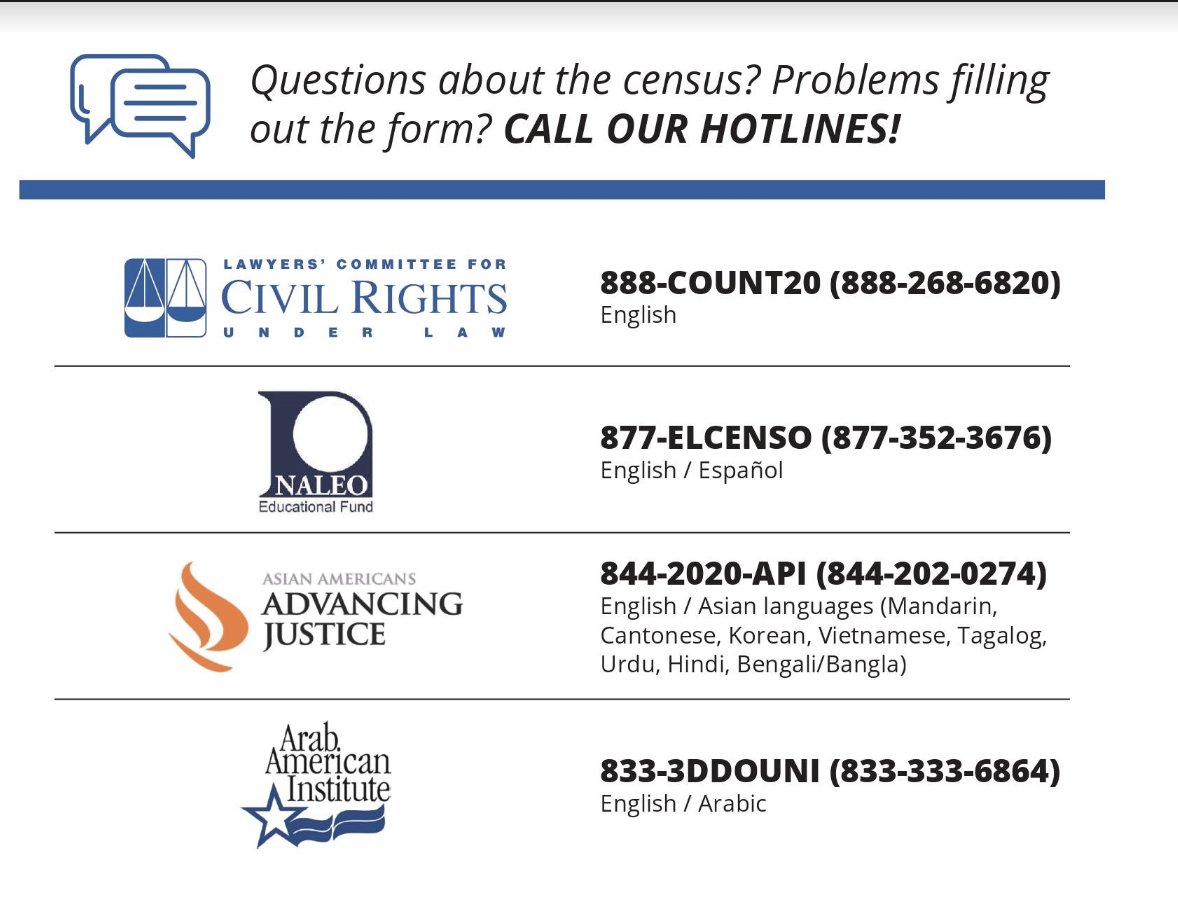Census Tips Form
The Lawyers’ Committee for Civil Rights Under Law seeks Census Tips
- If you have a question about the Census or were not able to complete the form, please fill out this form instead.
- if you are aware of an action (or lack of action) taken by the federal government that would impact the accuracy of the Census count, we want to hear about it.
- Were you a Census enumerator and have tips to share about the administration of the Census? Are you currently working for the Census Bureau and are concerned about the data processing?
- All information will be kept confidential.
Contact Us
888Count20@lawyerscommittee.org
Litigation
2020 Census Citizenship Question
The Lawyers’ Committee for Civil Rights Under Law, along with co-counsel Manatt, Phelps & Phillips, filed a lawsuit on April 17, 2018, that challenged this late addition of a citizenship question to the 2020 Census. Read more about the lawsuit here.
On September 24, 2020, the U.S. District Court for the Northern District of California issued an order blocking the Trump administration’s attempts to rush the 2020 Census. Under the Court’s Order, the census count will continue through Oct. 31, as the Census Bureau had earlier planned, and its data processing will continue under a timeline that allows for a full, fair and accurate overall tabulation and reporting of the total population to the President. Read more here.
Resources
- Election Protection https://866ourvote.org/
- NALEO: Hagase Contar https://hagasecontar.org/
- Asian Americans Advancing Justice: Count Us in 2020 https://www.countusin2020.org/
- Arab American Institute: Yalla Count Me In https://yallacountmein.org/
- The Brennan Center’s Analysis of Redistricting Implications of the Census Extension
Other Resources
- The Census Countshttps://censuscounts.org/
- S Census Bureau www.census.gov
Webinars
March 23, 2020: Counting Black Children in the 2020 Census
Nearly 1 million children (4.6% of children under the age five) were not counted in the 2010 Census. The undercount rates for black children is more than twice as high as the estimate for non-black children, thereby adversely affecting needed resources for families, neighborhoods, and overall communities. In an effort to reduce this underrepresentation of black children, join us for our webinar, Counting Black Children in the 2020 Census, as we discuss this issue, share resources, and provide effective strategies used throughout the country to ensure a complete and accurate count.
- Fact Sheet
- Webinar Recording
- Webinar Write-Up
- Counting Black Children (PDF)
- Undercount of Young Black Children Paper, by Count All Kids
- Differential Census Undercount: Chapter focused on the Black Population
March 30, 2020: Counting Black Men & Young Black Males in the 2020 Census
Estimates indicate that somewhere between 1.1 million and 1.7 million black residents will be missed in the 2020 Census. The undercount of black men and young black males is particularly acute, given the number of black men and young males omitted (missed) from the count in relation to this undercount. This undercount presents serious ramifications for needed funds in communities as well as for informing policy decisions. Join us for our webinar, Counting Black Men and Young Black Males in the 2020 Census, as we discuss issues affecting an accurate count, share resources, and provide examples of what organizations are doing to get-out-the-count of black males and young black men.
- Fact Sheet
- Slides
- Watch the Webinar Recording Here!
April 2, 2020: Counting Formerly Incarcerated Individuals in the 2020 Census
With Jeri Green, National Urban League; Monica McInnis, OneVoice; and Bruce Reilly, Vote
Counting individuals formerly incarcerated is uniquely problematic given the issues confronting individuals impacted by the criminal justice system and returning to their communities. Join us for our webinar, Counting Formerly Incarcerated Individuals in the 2020 Census, as we discuss methods to get formerly incarcerated individuals counted, what organizations are doing to get-out-the-count, Census Bureau updates on Service-Based Enumeration & enumeration at transitory locations, and some discussion of forthcoming initiatives to dismantle prison gerrymandering.
- Fact Sheet
- Webinar Slides
- Watch the Webinar Recording Here!
April 6, 2020: Counting Black Immigrants in the 2020 Census
With Nyma Gyamfi, Black Alliance for Just Immigration.
Black immigrants are the fastest growing immigrant population in the United States, yet less than 60% of this population was counted in the 2010 Census. In an effort to reduce this underrepresentation of Black immigrants, join us for our webinar, Counting Black Immigrants in the 2020 Census, as we discuss this issue, share resources, and provide effective strategies used throughout the country to ensure a complete and accurate count.
- Webinar Slides
- Watch the Webinar Recording Here!
April 17, 2020: African Americans and the Coronavirus – At the Intersections of Policy, Politics, and Public Health
With the National Conference of Black Political Scientists.
Frequently Asked Questions
- When does the census start and end?
The 2020 Census has begun! Most households will have received a Census questionnaire in the mail to complete by mid-April. Additionally, you can respond now over the internet or over the phone. In August, the Census Bureau will begin following up with people who have not completed the Census. The deadline to respond to the Census has been moved to October 31st but you can submit your form now!
- Do I have to fill out the census form?
Yes. The Census, which occurs every ten years, is mandated by the Constitution, and federal law requires all U.S. residents to complete the Census.
- Will my answers be kept confidential?
Yes. Under a law known as “Title 13,” Census data can only be used for statistical purposes. No personal information can be used against a Census respondent in a Court or by a government agency.
- Why are we being asked to respond over the internet?
For the first time, this year’s Census can be taken over the internet for convenience – and it takes less time than finishing your morning coffee! That said, you can still respond over the phone or by mail if you prefer.
- What happens if I am temporarily living with a relative?
You should be counted where you live and sleep most of the time as of April 1, 2020 – if that is with a relative, you should be counted as part of your relative’s household. If you aren’t sure, count yourself where you are staying on Census Day (April 1, 2020).
- What happens if I don’t fill out the form?
Census enumerators (workers) will follow up at your home to ask you to complete the survey. This may happen starting in August if you have not completed the Census. If you still choose to not complete the survey, you could be subject to a $100 fine.
- Do I have to list my children?
Yes, you should list your children – listing every member of your household helps ensure that your community gets its fair share of federal funding tied to the Census.
- Do I have to list my children in college? What if they are living with me now because their campus was shut down due to the Coronavirus?
If your child in college would normally be living at another address, you do not count them at your address. Your child would fill out their own form if they lived off-campus. Students who stay in college housing (such as dorms) will be counted as part of “group quarters” by a group quarters administrator.
- Will I be asked to provide my Social Security number?
No. The Census does not ask for any financial information, such as your Social Security number, bank account number, or other personal financial information.
- Must I state if I am a U.S. citizen?
No. The United States Supreme Court ruled that the citizenship question could not be added to the Census for 2020.
- Will the questionnaire be in my native language?
You can respond to the Census online or over the phone in English or in 12 additional languages (Spanish, Arabic, Japanese, Portuguese, Vietnamese, Chinese, French, Korean, Russian, Haitian-Creole, Polish, and Tagalog). Additionally, guides to filling out the census are available in 59 languages.
- What are the different ways to submit the Census?
The Census can be submitted online, over the phone, or by responding to the Census questionnaire in the mail.
- What exactly is the Census?
The Census is a full count of the population of all residents of the United States, taken every ten years in accordance with the U.S. Constitution.
- Why is the Census important?
Population counts from the Census effect redistricting (that is, how many districts each state gets), funding allocations for federal programs, and where businesses choose to invest. Taking the Census allows your community to receive its fair share of funding for vital programs like schools, childcare, health care, transportation, and housing. For more, visit the Census Bureau website.
- How will the 2020 Census be affected by the Coronavirus (COVID-19)? Will it be pushed back or postponed?
The Census will not be pushed back, particularly because it has never been easier to respond over the phone or online. COVID-19 may, however, delay Census enumerators from visiting households that have not completed Census forms. It is also possible that the final Census counts may not be delivered to the President until mid-2021 because of COVID-19. Regardless, you can still submit your phone online now!
- Why does the government need the information from the Census? Don’t they already have information about me?
While the government does have some administrative records from other programs, data from the Census is the most comprehensive measure available to allocate federal funding. For more, see this resource.
- Will the Census bureau work with ICE or other immigration authorities?
No. Under the law, Census data can only be used for statistical purposes, and individual data cannot be used by other government agencies (including ICE). For more, see this resource.
- What are the questions on the 2020 Census?
There are nine questions on the 2020 Census: number living in home, additional persons on April 1, 2020, own/rent, telephone number, and name, age, sex, race, ethnicity of everyone living there. You can view a sample Census form here.
- What do I do if I made a mistake filling out the Census?
Contact the Census Bureau at (301)-763-INFO (4636).
- How do I know if the person claiming to be a Census enumerator (worker) is legitimate?
Census enumerators will not be visiting households until August 11th. A legitimate enumerator will have an ID badge containing his or her photograph, a Department of Commerce watermark, and an expiration date. She or he will also be willing to provide a phone number for the regional Census office for verification, if asked. She will be conducting her work between 9 AM – 9 PM and will be carrying a laptop and/or bag with a Census Bureau logo. If you are still unsure about an enumerator’s identity, call (800)-923-8282 to speak with a local Census Bureau representative. For more, see this resource.
- How do I count people in unusual living situations (including children in shared custody, foster children, grandchildren living with a grandparent, or renters)?
Generally, all persons should be counted where they live and sleep most of the time as of April 1, 2020. For more information, use this resource.
- Why does the Census ask about race and ethnicity?
Race/ethnicity data allows the Census Bureau to create statistics about race and to provide other statistics by racial groups. This data helps federal agencies monitor compliance with anti-discrimination provisions, such as those in the Voting Rights Act and the Civil Rights Act. For more, see this resource.
- How should I answer the questions about race and ethnicity?
You should answer the race and ethnicity questions based upon how you self-identify. For more information, see this resource.
- What do I do if I lost my Census questionnaire?
You can always fill out the questionnaire online or over the phone. But if you would prefer to fill out a paper questionnaire, call 1-800-354-7271 for assistance in getting a new form. Telephone lines are open: Monday–Friday 9 a.m. to 9 p.m.; Saturday 9 a.m. to 7 p.m.; Sunday 11 a.m. to 9 p.m.
- Why did I receive a questionnaire before April 1, 2020, if that is “Census Day?”
Invitations for the Census go out before April 1 to ensure that people have enough time to respond to the Census. You can respond to the Census (either online, over the phone, or through the mail) anytime, starting now.
- How long do I have to fill out the Census?
You should fill out the Census as soon as possible. If you do not fill out the Census by August, the Census Bureau may send an enumerator to your home to collect Census data. The firm deadline for filling out the Census is September 31st. For more on the timeline for completing the Census,
Contact the Lawyers’ Committee for Civil Rights Census Hotline at 888-Count-20 (888-268-6820).
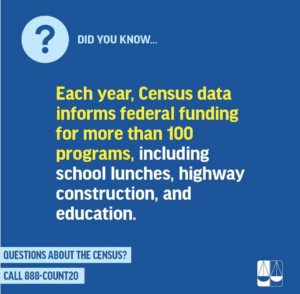
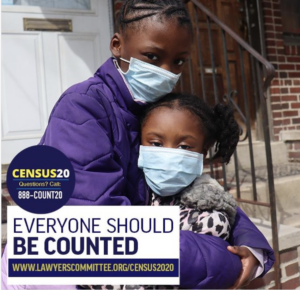
The allocation of nearly $800 billion annually for federal programs and services
- An accurate count is needed for resources like education programs, job training, transportation improvements, and a host of other needed services in our communities;
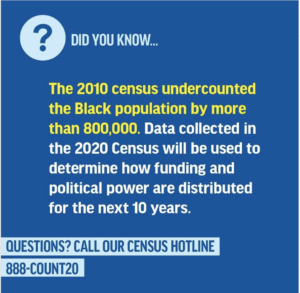
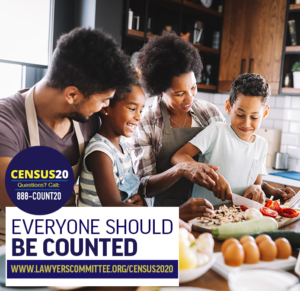
- An inaccurate count will result in flawed data used to draw election districts for your federal & state elected officials as well as your county commissions, city councils, and school boards.
